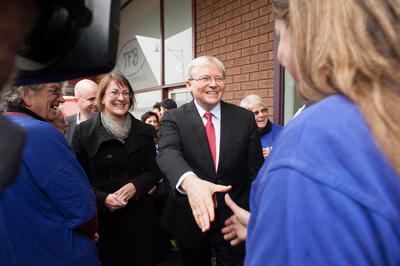These events must be puzzling to foreign observers; they have left many in Australia mesmerised by their Shakespearian dimensions. While they may have few consequences for Australia’s long-term management of its interests in the world, there is little doubt that they will have an immediate bearing on the diplomacy of how these affairs will be conducted over the coming few months.
For one thing, it is almost certain that Prime Minister Rudd will change the date on which former Prime Minister Gillard had scheduled the national election. The planned date of 14 September would have made it very difficult for a prime minister fighting an extremely close election to attend the G20 Summit in St Petersburg on 5 September. Rudd will want to be there as the incumbent prime minister for the theatre and impact of Australia’s assuming the chair in 2014. The probability is high that he’ll go to the polls later to make that possible (he has the option of calling the election as late as 30 November). Or he could call the election earlier hoping to succeed against odds that have dramatically and favourably narrowed since he stepped into the top job. If Opposition Leader Tony Abbott wins an election held before the summit, he would certainly find it difficult to get his mind around managing Australia’s high global diplomacy over the ensuing few weeks; it would be much easier for him to take over after the summit in St Petersburg.
Prime Minister Rudd rightly claims a measure of personal ownership of the G20’s elevation to summit status, and the definition of its role in reshaping global governance. Julia Gillard, although she came to the leadership with deliberately modest ambitions in international affairs, proved a deft and effective successor to Rudd in prosecuting Australia’s interests in both global and regional forums, ironically most especially in putting perspective on the relationship with Asia and putting the relationship with China on a much surer footing (an area in the heartland of Rudd’s competence and professional interest). When the history of her prime ministership is written dispassionately, this will surely be one of her most impressive legacies. Opposition Leader Abbott is yet to be tested on all these affairs, although the assumption is that, given the space and time, he will assuredly rise to the occasion.
Perhaps these local Australian theatrics don’t matter a jot to the substantial game of global politics and global policy development. Ordinarily they would not. But Australia’s role as the G20 Chair next year, the fragility of the global economy and fluidity in global politics all underline the importance of Australian leadership in making the yet-to-be-fully-bedded-down G20 governance work to alleviate — if not resolve — pressing global problems.
Colin Bradford of the Brookings Institution, in this week’s lead essay says ‘… there is great anticipation [of Australia’s G20 presidency] — Australia’s history of internationalism gives hope that it can help launch global economic recovery and global governance reform. The government’s white paper, Australia in the Asian Century, is a superb launch pad for Australia’s vision and role in the world’.
Bradford makes the point that the leadership of middle powers like Australia can be helpful in crafting a way forward on difficult global policy issues. ‘The big countries do not trust each other, and the rest of the world does not trust the G20’, Bradford argues. ‘Australia can change this by using its position to improve relations among the major G20 economies and beyond. In some ways, the G20 Summit mechanism forces all member countries to behave like middle powers, which are in the majority. This is a good thing for a number of reasons’.
It may be true, as Bradford says, that in so far as middle powers represent more than themselves and their narrow self-interest in global affairs, they tend to place multilateralism at the centre of their foreign policies, nesting their national interests within broader regional or global interests. As a result, middle powers tend to inculcate a higher level of trust than larger powers. And, as he observes in passing, certainly the changing balance in big power relativities is likely to make international behaviour in this frame peculiarly beneficial at this point in human history.
As Bradford says, Australia has some assets in the G20 game beyond its national capabilities, especially in its close working relationships with Asia — most notably Indonesia, Korea, China and India. Bradford is sceptical that the G20 has had great impact beyond its initial and critical international coordination of global recovery policies. Perhaps he understates in that view what the G20 has done in focusing these Asian powers on their global interests and responsibilities. Unfortunately Japan has yet to fully come to the same enterprise, hankering as it still does after its unique but largely ineffective status in the G7 or G8. One hopes that may change with the new leadership in Japan. But for the other powers in Asia — missing in action in thinking about global responsibilities before the crisis — the G20 has brought a deep change in mindset and the beginnings of real engagement and understanding.
It’s a big challenge for a relatively small player on the global stage to fulfil these expectations of it: the national policy capabilities, however fleet-footed and practised in the game of living by their wits in international dealings, will be vastly stretched. They must all be mobilised with an intensity and purpose that will carry other bigger and smaller players along with them. And it will help, more than at the margin, if the Australian political leadership handles the baton change with sureness and confidence.
Peter Drysdale is Editor of the East Asia Forum.

